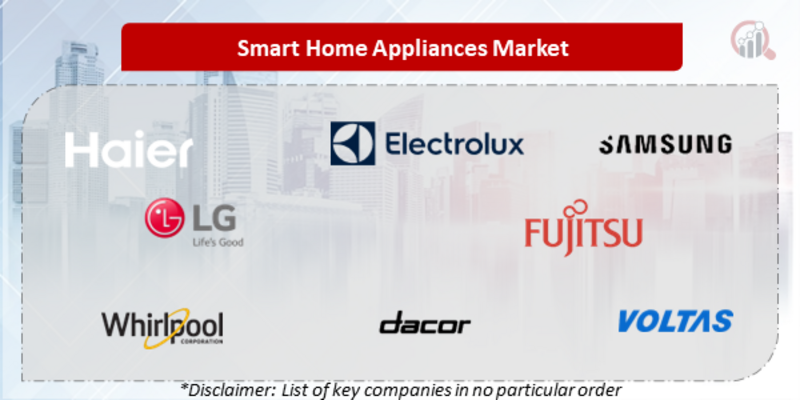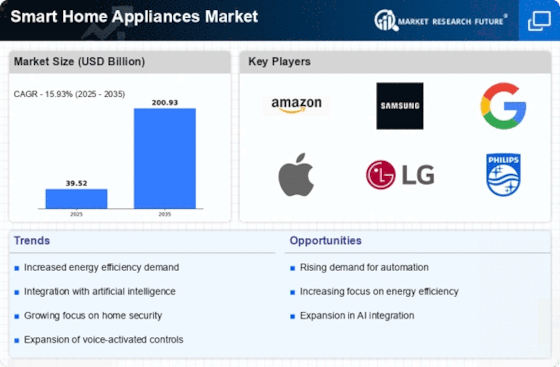Top Industry Leaders in the Smart Home Appliances Market

The Competitive Landscape of the Smart Home Appliances Market
The once futuristic vision of intelligent appliances seamlessly automating our homes has become a tangible reality. The Smart Home Appliances market, fuelled by technological advancements and a growing desire for convenience, is witnessing a fierce battle for supremacy. Understanding the strategies at play, the factors driving market share, and the rising stars disrupting the industry is crucial for navigating this dynamic landscape.
Key Player:
- Haier Group Corporation
- Electrolux
- Samsung Group
- LG Electronics Inc.
- Whirlpool Corporation
- Fujitsu General Limited
- Dacor
- Voltas Limited
- Panasonic Corporation
- Robert Bosch GmbH.
Strategies Adopted by Market Leaders:
- Ecosystem Building: Incumbents like Samsung, LG, and Whirlpool invest heavily in building robust ecosystems of interconnected devices. This allows for comprehensive home automation and integration with various platforms, attracting tech-savvy customers.
- Openness and Collaboration: Recognizing the benefits of open standards and partnerships, established players embrace platforms like Z-Wave and Zigbee, enabling compatibility with a wider range of devices and smart home hubs.
- Voice Assistant Integration: Seamless integration with popular voice assistants like Google Assistant and Amazon Alexa is becoming a key differentiator, providing hands-free control and enhanced user experience.
- Focus on User Experience: Intuitive interfaces, mobile app control, and personalization features are crucial for ease of use and fostering user engagement with smart appliances.
Factors for Market Share Analysis:
- Functionality and Smart Features: Appliances offering advanced features like remote control, scheduling, energy optimization, and personalized settings gain an edge. Connectivity and automation capabilities are key differentiators.
- Cost Competitiveness: Balancing technology with affordability is crucial, particularly for mass-market adoption. Players offering smart features at competitive prices attract a broader customer base.
- Data Security and Privacy: Robust data security measures and transparency in data handling are paramount for building trust and mitigating privacy concerns. Compliance with regulations is essential.
- Integration and Interoperability: Seamless integration with existing home automation systems and compatibility with a diverse range of smart devices broaden market reach and appeal.
New and Emerging Companies:
The market is witnessing a surge of innovative startups offering niche solutions. Ecobee, for example, specializes in smart thermostats with AI-powered climate control for energy efficiency. Another player, August Home, focuses on smart door locks and access control solutions for enhanced home security. Additionally, companies like Sense Labs and Brilliant are developing whole-home automation systems that take smart home control to the next level.
Industry Development:
Oct 2023, Samsung: Unveiled its Bespoke AI washer and dryer with improved AI features for automatic cycle selection and detergent dispensing.
Nov 2023, LG Electronics: Announced the launch of its InstaView ThinQ refrigerator with built-in touchscreen and voice control capabilities.










